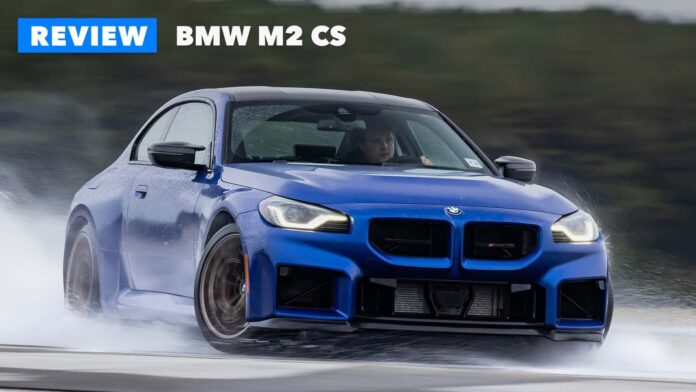The current generation (G87) BMW M2 is widely regarded as one of the best modern performance cars available—a sentiment shared by many enthusiasts. For 2026, BMW has upped the ante with the introduction of the M2 CS, a model that brings together enhanced chassis components, an upgraded engine, reduced weight, and extensive use of carbon fiber. The key question: does this combination justify the substantial price tag, which is roughly $32,000 higher than the standard M2, reaching nearly $100,000?
Design and Exterior Upgrades
The most immediate visual differences between the M2 CS and the standard M2 are evident in its more aggressive front fascia—a more grille-less design designed to maximize airflow for cooling systems, including oil coolers, radiators, and the intercooler’s heat exchanger. Standard features include a carbon fiber roof, rear diffuser, and mirror caps, along with a painted ducktail spoiler. Lightweight, forged wheels—19 inches in the front and 20 inches in the rear—fill out the fenders.
Interior Refinements and Lightweighting
Inside, deep carbon fiber bucket seats provide excellent support for front seat occupants. While not the most comfortable for all body types, they contribute to an ideal performance driving position. Notably, the center console lacks cupholders, although a small cubby at the back offers a surprisingly accommodating space for a large soda cup—an ironic touch given the designers’ intentions. The interior also features a mix of carbon fiber trim, soft leather, dense piano black plastic, and Alcantara.
The M2 CS has shed 97 pounds compared to the non-CS model, thanks to a diet that includes lightweight components. Selecting the optional M Carbon Ceramic brakes ($8,500) further reduces weight by an additional 40 pounds.
Mechanical Enhancements and Engine Performance
Beyond aesthetics, the M2 CS boasts a range of mechanical upgrades. Spring rates are firmer, lowering the ride height by 8.0 millimeters, and alignment is more camber-rich. While many core components are shared with the standard M2, the suspension top hats, control arms, and dampers are derived from the M4 CSL—the former found on the M4 GT4 race car. BMW has also retuned its adaptive dampers, steering, ABS, throttle mapping, and traction control to enhance spirited driving.
The heart of the M2 CS is its twin-turbocharged 3.0-liter S58 inline-six engine, which now produces 523 horsepower and 479 pound-feet of torque—an increase of 50 hp and 36 lb-ft over the standard M2. This allows it to accelerate from 0 to 60 mph in just 3.7 seconds and complete the quarter-mile in 11.7 seconds. The sole transmission option is an eight-speed automatic, unfortunately lacking a manual.
On the Track: Ferocious Power and Precise Handling
The majority of the evaluation took place at BMW’s Laurens Proving Grounds in South Carolina, on both a high-speed test track and an autocross course. The most striking characteristic of the M2 CS is its ferocious power delivery, especially in the mid-range. While the standard M2 is already capable, the CS’s upgrades make it even more entertaining and, at times, quite aggressive. With traction control disabled, it’s easy to modulate the throttle and induce controlled slides, aided by a communicative chassis and excellent steering.
The wet track conditions highlighted the effectiveness of the M Traction Control system’s ten levels, allowing for precise control over slip restriction. The suspension and steering refinements contribute to exceptional yaw response, with solid turn-in and direct steering—an experience refined even on less-than-perfect road surfaces.
Brakes and Driving Dynamics
Equipped with six-piston front calipers and single-piston rear calipers clamping down on 15.0-inch front and 14.0-inch rear rotors (carbon ceramic brakes were available as an option), the M2 CS offered outstanding braking performance. The carbon ceramic brakes exhibited excellent stopping power and modulation, making them easy to control even in challenging conditions.
Overall, the M2 CS delivers a driving experience reminiscent of a mid-engine car, thanks to its finely tuned chassis and lightweight design—the front end feels remarkably light. While the ride quality is noticeably harsher than the standard model, it’s a trade-off for a more hardcore trim, and enthusiasts will find it perfectly agreeable for weekend track days and to-and-from-the-track duties.
Conclusion
The 2026 BMW M2 CS presents a compelling case for those seeking a track-focused, enthusiast-oriented coupe. While the $100,000 price tag is significant, it represents a better value compared to the previous-generation M2 CS, offering more power, refined chassis components, and an impressive traction control system. Direct competitors like the Lotus Emira and Porsche 718 Cayman offer similar experiences, but the M2 CS’s blend of twin-turbo power, conventional trunk space, and a more spacious interior with rear seats make it a uniquely appealing option for driving enthusiasts. If you crave thrilling performance, a conventionally shaped trunk, and a more spacious interior with two back seats, the M2 CS delivers a truly exhilarating driving experience at a price that, while substantial, justifies the level of performance and engagement it provides.


































